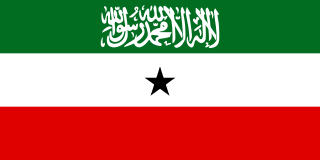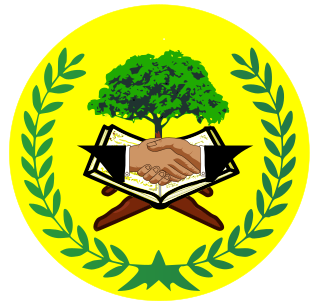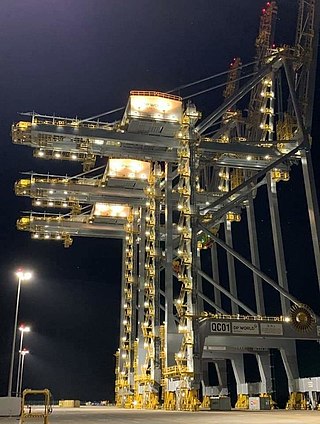
Somalia, officially the Federal Republic of Somalia, is a country in the Horn of Africa. The country is bordered by Ethiopia to the west, Djibouti to the northwest, the Gulf of Aden to the north, the Indian Ocean to the east, and Kenya to the southwest. Somalia has the longest coastline on Africa's mainland. Its terrain consists mainly of plateaus, plains, and highlands. Hot conditions prevail year-round, with periodic monsoon winds and irregular rainfall. Somalia has an estimated population of around 17.1 million, of which over 2 million live in the capital and largest city Mogadishu, and has been described as Africa's most culturally homogeneous country. Around 85% of its residents are ethnic Somalis, who have historically inhabited the country's north. Ethnic minorities are largely concentrated in the south. The official languages of Somalia are Somali and Arabic. Most people in the country are Muslims, the majority of them Sunni.

Somaliland, officially the Republic of Somaliland, is an unrecognised sovereign state in the Horn of Africa, on the southern coast of the Gulf of Aden. It is bordered by Djibouti to the northwest, Ethiopia to the south and west, and Somalia to the east. Its claimed territory has an area of 176,120 square kilometres (68,000 sq mi), with approximately 5.7 million residents as of 2021. The capital and largest city is Hargeisa. The government of Somaliland regards itself as the successor state to British Somaliland, which, as the briefly independent State of Somaliland, united from 1960 to 1991 with the Trust Territory of Somaliland to form the Somali Republic.

British Somaliland, officially the Somaliland Protectorate, was a British protectorate in present-day Somaliland. During its existence, the territory was bordered by Italian Somalia, French Somali Coast and Abyssinia. From 1940 to 1941, it was occupied by the Italians and was part of Italian East Africa.

Sanag is an administrative region (gobol) in north eastern Somaliland. Sanaag has a long coastline facing the Gulf of Aden to the north, and is bordered by the region of Sahil to the west, Sool to the south and Somalia to the east. The region is disputed by the self-declared Republic of Somaliland and Puntland, a Federal Member State of Somalia. Its capital city is Erigavo. Sanaag is the largest region of Somaliland, accounting for 35% of Somaliland's total land area.

Marodi Jeh is an administrative region (gobol) in western Somaliland. It is the most populous region of the country. It is bordered by Awdal to the west, Sahil to the north, Togdheer to the east and Ethiopia to the south. Marodi Jeh was created by splitting the previously existing region (gobolka) Woqooyi Galbeed in two, the other part being Sahil. In 2007 the region of Woqooyi Galbeed was renamed to Maroodi Jeex. Woqooyi Galbeed was thus much larger than Marodi Jeh.

The politics of Somaliland take place within a hybrid system of governance, which, under the Somaliland constitution, combines traditional and western institutions. The constitution separates government into an executive branch, a legislative branch, and a judicial branch, each of which functions independently from the others.

The House of Representatives is the lower house of the bicameral Parliament of Somaliland, with the House of Elders being the upper house.

The House of Elders, also known as the Guurti, is the upper house of the Parliament of Somaliland. It has 82 members, representing traditional leaders. The House of Elders is mandated with considering bills proposed by the lower house of the parliament, the Somaliland House of Representatives.

The Somaliland National Armed Forces are the military services of Republic of Somaliland. The Somaliland National Armed Forces consist of the Somaliland National Army, the Somaliland Coast Guard, the Somaliland Police Force, the Somaliland Custodial Corps, the Somaliland Immigration and Border Control and the Somaliland Fire Brigade. There is no air force.

The following outline is provided as an overview and topical guide to Somaliland:

"Samo ku waar" is the national anthem of Somaliland, a self-declared republic that is internationally recognized as an autonomous region of Somalia.

The Somaliland Police, officially the Somaliland Police Force is a body responsible for law enforcement in the Republic of Somaliland.

The Somaliland national football team is the football team that represents Somaliland, a self-declared republic that is internationally recognized as a de facto state. Although Somaliland is a de facto state, it has not yet received international de jure recognition. Somaliland is not a member of FIFA and CAF; it is, instead, an associate member of ConIFA, an association established in 2014 of teams from dependencies, unrecognised states, minorities, stateless peoples and regions that are not affiliated with FIFA.

Musa Bihi Abdi is a Somaliland politician and former military officer who has been President of Somaliland since December 2017. During the 1970s, he served as a pilot in the Somali Air Force under the Siad Barre administration. In 2010, Bihi was appointed the chairman of the ruling Kulmiye of Republic of Somaliland. In November 2015, Bihi was selected as the party's Presidential Candidate at the 5th annual central committee convention.

Education in Somaliland is provided in public and private schools. Education is Somaliland is managed by Ministry of Education and Science which controls the development and administration of state schools, it's also has an advisory and supervisory role in private schools.

Somaliland a self-declared independent country in the Horn of Africa in which inhabitants were initially governed by various kinship networks. Upon contact with Europeans, treaties were signed in the area to secure rights to trade in the territory in exchange for protection of clans from rivals. Britain formally extended a protectorate over British Somaliland in 1898. Inhabitants of Somaliland were British Protected Persons from that date until they gained their independence in 1960 and joined in the union of their state with Italian Somaliland to form the Somali Republic. Inhabitants derive their nationality from Somali law. The legal means to acquire nationality, formal legal membership in a sovereign nation, differ from the domestic relationship of rights and obligations between a citizen within its nation, known as citizenship. Nationality describes the relationship of an individual to the nation under international law, whereas citizenship is the domestic relationship of an individual within the state. As the African Union, United Nations, and no independent nation has recognized its national sovereignty, Somaliland's inhabitants are Somali nationals, but since declaring its independence in 1991, it has de facto authority to control internal affairs and citizenship within its territory.

The visa policy of Somaliland dictates the use and acquisition of visas in Somaliland. In accordance with the law, citizens of all countries require a visa to visit Somaliland. Somaliland and Somalia have completely different visa policies and Somaliland authorities do not recognize national visas issued by Somalia.

Sahil is an administrative region (gobol) in northern Somaliland with the port city of Berbera as its capital. It was separated from Woqooyi Galbeed and became a province in 1991. In 1998, the Sheikh District of Togdheer was incorporated into Sahil region. The region has a long coastline facing the Gulf of Aden to the north. Sahil borders Awdal to the northwest, Maroodi Jeex to the southwest, Togdheer to the south and Sanaag to the east.

The COVID-19 pandemic was confirmed to have reached Somaliland in March 2020. As of 16 August 2021, there are 4703 cases and 319 deaths. 68206 tests have been conducted.

Somaliland and the United States do not have official diplomatic relations. While Somaliland operates a representative liaison office in Washington, D.C., it does not have formal diplomatic status under the provisions of the Vienna Convention on Diplomatic Relations. Both countries do maintain contact as delegations from both sides have met in the past.